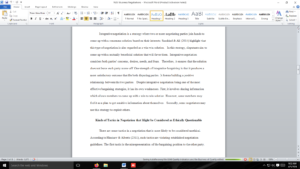Distributive bargaining and integrative negotiation situation
1.Compare and contrast the distributive bargaining and integrative negotiation situation. Identify the strengths and weaknesses of each method, and how they affect the negotiation process. (Be specific ).
2.Identify and explain the kinds of tactics in negotiation that might be considered as ethically questionable. Why do negotiators use these tactics? What are the motives and consequences of using such tactics? (Be as detailed as possible).
3.Discuss the role of mood and emotion in the negotiation process and examine the effects of positive and negative emotions in negotiation. (Be specific). Explain the role played by perceptions, cognitions, and emotions in negotiation.
4.Analyze the influence of culture on negotiation from the research perspectives. What are the effects of culture on negotiation outcomes, on the process and information flow, and the effects of culture on negotiator ethics and tactics? (Be specific).
5.Evaluate why power is important to negotiators, and how to best deal with negotiators who have more power. (Be detailed).
Write between 1,250-1,500 words (approximately 3 – 5 pages) using Microsoft Word in APA style, see example below.
- Use font size 12 and 1” margins.
- Include cover page and reference page.
- At least 80% of your paper must be original content/writing.
- No more than 20% of your content/information may come from references.
- Use at least three references from outside the course material, one reference must be from EBSCOhost. Text book, lectures, and other materials in the course may be used, but are not counted toward the three reference requirement.
- Cite all reference material (data, dates, graphs, quotes, paraphrased words, values, etc.) in the paper and list on a reference page in APA style.
Please provide original work. No plagiarizing.
Answer preview
Integrative negotiation is a strategy where two or more negotiating parties join hands to come up with a consensus solution based on their interests. Susskind & Ali (2014) highlight that this type of negotiation is also regarded as a win-win solution. In this strategy, disputants aim to come up with a mutually beneficial solution that will favor them. Integrative negotiation considers both parties’ concerns, desires, needs, and fears. Therefore, it ensures that the solution does not leave each party worse off. One strength of integrative bargaining is that it produces a more satisfactory outcome that fits both disputing parties. It fosters building a positive relationship between the two parties. Despite integrative negotiation being one of the most effective bargaining strategies, it has its own weaknesses. First, it involves sharing information which allows members to come up with a win to win solution. However, some members may feel it as a plan to get sensitive information about themselves. Secondly, some negotiators may use this strategy to exploit others.
[1675 Words]

Distributive bargaining and integrative negotiation situation

